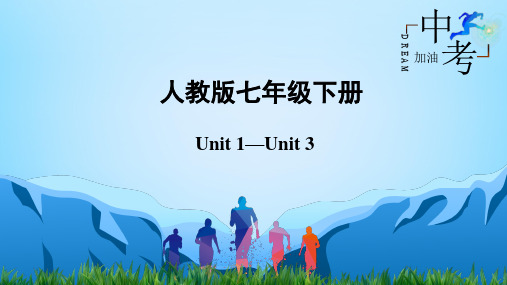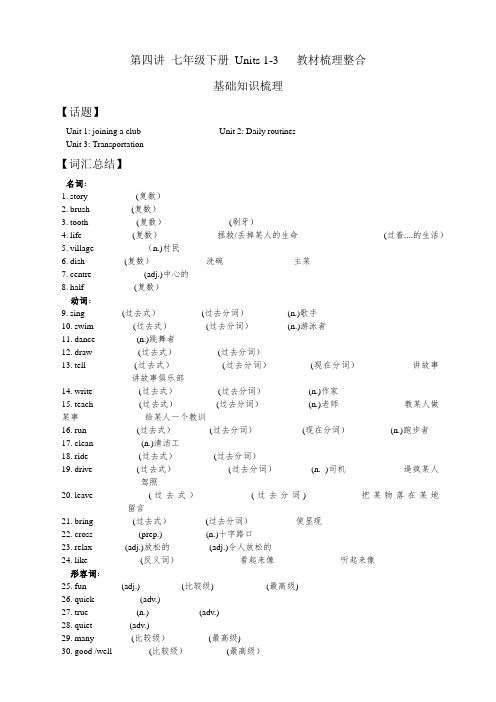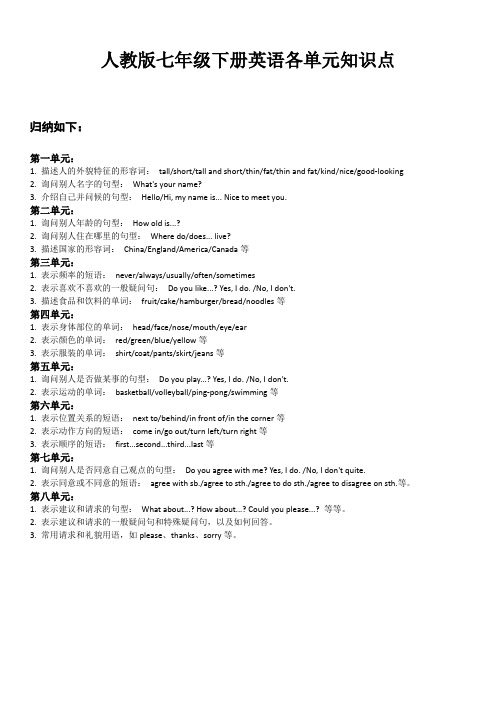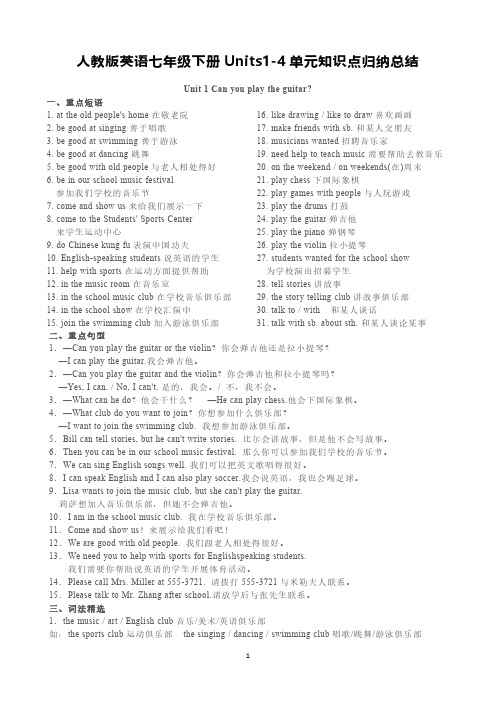人教版英语七年级下册 Unit 1 ---unit3重难点 归纳
- 格式:doc
- 大小:352.87 KB
- 文档页数:28

【板块1】Unit 1 Can you play the guitar?1.情态动词+V原 can do例:He can swim.I can dance.We can sing.2.Play+ the+ 西洋乐器play the guitar play the violin球类,棋类(不加)play chess play basketball3. join 参加社团、组织、团体 join the chess club join the English club4. 4个说的区别:say+内容 say hello toSpeak+语言 speak EnglishTalk 谈论 talk about sth talk with sb talk to sbTell 告诉,讲述 tell sb (not)to do sthTell stories/ jokes5. want= would like +(sb)to do sth6. 4个也的区别:too 肯定句末(前面加逗号) I like English, too.Either否定句末(前面加逗号) I don’t like English, either.Also 行前be 后 I also like English.7.be good at+ V-ing擅长于I am good at swimming.be good for 对…有益(be bad for对…有害)Apples is good for our health.be good with和…相处好He is good with old people.8. How/ what about+V-ing …怎么样?(表建议)9. 感官动词(look, sound, taste, smell, feel)+adj/ likelook like例:What does he look like?sounds like例:Sounds like you have fun.10.show sth to sb=show sb sthHe shows our school to his friend.13. help sb (to)do sthHelp sb with sth14. be busy doing sth/ be busy with sth16.need to do sth17. be free= have time18.make friends with19. call sb at +电话号码例:Call me at 1008620.on the weekend= on weekends21. English-speaking students 说英语的学生(带有连词符,有形容词性质)22. do kung fu表演功夫【课堂练习】一、单选:1( )How do you______this in English? A.speak B.say C.tell2( )Do you know a man_____Jack Smith? s d3( )-Do you know the way to the post office?-Yes,Follow me and I’ll______you the way(给你带路)A.callB.showsC.show4( )I can play______guitar,but I can’t play_____Chinese chess.A./,theB.the,aC.the,/5( )Can your father________Chinese?/Yes,she can____Chinese a little.A.speak,speaksB.say ,sayC.speak,speak6( )I need_______a song with you.A.to singB.singingC.sing7( )Tom can’t play the violin_____play chess.A.andB.butC.or8( )Our teacher told us________carefully in class.A.listenB.to listenC.listening9( )I can sing well, I want_______the music club..join B.to join C.joining10( )You sing well,You______a good musician when you grow up.A.maybeB.may beC.may11( )They often help kids________dancing.A.toB.atC.with.12( )I can_______Chinese Kongfu.A.playB.doC.make13( )He tells Jim_______to school on time.A.goB.to goC.goes14( )Victor is good_____singing,,and so he’s good_____the children in the music club.A.at,forB.with,forC.at,with15( )Please call Alan______053-765498.A.at.B.forC.on16( )Jim,can you_______this word in Chinese?/Yes,I can_______a little Chinese.A.speak,sayB.say,speakC.tell,speak17( )Sam can sing English songs________,but I can’t.A.very goodB.very muchC.very well.18( )Let’s______for a walk,shall we?A.to goB.goingC.go二、情景翻译1.你会弹吉他吗?不,我不会。

提分干货|人教版七下英语Unit1-3单元课文难点解析,不得不看!【教师寄语】:Well begun is half done. 好的开端是成功的一半。
Section A1.Can you play the guitar?你会弹吉他吗?【解析1】1:can是_动词,它的意思是,表示某人具有做某事的能力,情态动词后必须用动词,情态动词can没有人称和数的变化。
它的否定句是在can 的后面直接加,也可以缩写为。
它的一般疑问句是把can放在句子的开头并且大写。
①我弟弟钢琴弹得非常好。
_____________________②我爸爸不能说日语______________③你能唱一些流行歌吗? _____________________【解析2】:play和表示球类的名词连用_用冠词;但是和表示乐器的名词连用的时候用冠词。
(填需要/不需要)①打篮球________;弹钢琴__________( ) ②My little sister _____ now, but she _____ some English songs.A. can’t swim; can singB. can’t to swim; can singsC. can swims; can’t singsD. can’t swimming; can singing( )③Lily is ______ active girl and she is fond of playing ______ volleyball.A. an; aB. a; theC. an; /D. a; /2.- What club do you want to join? 你想加入什么俱乐部?— I want to join the art club. 我想加入艺术俱乐部【解析1】:句型What+名词+一般疑问句?可以提问人物的身份、姓名、内容、性质和类别,也可以提问事物的目的、价格、数量和效果。


人教版新目标七年级下册unit1Canyouplaytheguitar? 知识点总结教学课题和单元检测1、cantalkaboutabilities2、掌握情态动词教学目标3、熟悉句型:Canyouswim?Yes,Ican./No,Ican’t.Whatcanyoudo?Ican.../Ican’t...Whatclubdoyouwanttojoin?Iwantto...教学重点与难点情态动词的掌握知识点总结1、情态动词+V原cando=beabletodo2、Play+the+乐器+球类,棋类3、join参加社团、组织、团体4、4个说的区别:say+内容Speak+语言TalkTelltalktosb谈论talkaboutsthtalkwithsb告诉,讲述tellsb〔not〕todosthTellstories/jokes5、want=wouldlike+〔sb〕todosth6、4个也的区别:too肯定句末〔前面加逗号〕Either否认句末〔前面加逗号〕Also行前be后Aswell口语中〔前面不加逗号〕7、begoodat+V-ing=dowellin擅长于begoodfor对有益〔bebadfor对有害〕begoodto对友好〔good可用friendly,nice,kindbegoodwith和相处好=geton/alongwellwith替换〕8、特殊疑问句的构成:疑问词+一般疑问句9、How/whatabout+V-ing怎么样?〔表建议〕10、感官动词〔look,sound,taste,smell,feel〕+adj/like11、选择疑问句:答复不能直接用Yes或者No,要从中选择一个答复12、studentswantedforschoolshow〔wanted表示招募,含有被动意义〕13、showsthtosb=showsbsth givesthtosb=givesbsth14、helpsb〔to〕dosthHelpsbwithsthWithsb’shelp=withthehelpofsbHelponeselfto随便享用15、bebusydoingsth/bebusywithsth16、needtodosth17、befree=havetime18、havefriends=makefriends19、callsbat+号码20、ontheweekend=onweekends21、English-speakingstudents说英语的学生〔带有连词符,有形容词性质〕22、dokungfu表演功夫单元检测一、完形填空:JaneandJohn1sisterandbrother.Theylikemusic.Janecanplaythepiano.Butshe2playtheviolin.Johncan’tplaythepiano.Buthe3playtheviolin.Todaythey4tocarryapianoto5bedroom.6pianoisheavy(沉).Theycan’t7it.8parentsaren’tathome.Butth ey9acousinbrotherisheretoday.TheyaskMiketo10them.()1、A.is B.am C.are()2、A.can B.can’t C.doesn’t()3、A.can B.can’t C.doesn’t()4、A.like B.want C.can()5、A.Jane B.her C.Jane’s()6、A.The B.a C./()7、A.take B.carry C.help()8、A.Jane’sandJohnB.JaneandJohn’s C.They’s()9、A.have B.like C.want()10、A e B.go C.join二、阅读理解:TomandMikearegoodfriends.Theyarekindtochildren.Theywanttofindsummerjobs.OnedayTomtellsMikethatBeidaiheKidsSum merCampneedshelpwithsports,musicandcomputers.Theyarebothverygladtohear(听说)this. Tomcanplaybasketballandvolleyball,andhecanswim,too.Mikecanplaytheviolin,thetrumpet,thedrumsandtheguitar.TomandMik elikecomputersverymuch.CantheyjointheSummerCamp?()11、TomandMikewantto____.A.helpwithsports,musicandcomputersB.begoodwithchildrenC.jointheSummerCampD.gethelpfromtheCamp()12、WhatdoestheSummerCampneedhelpwith?A.Flyingkites.B.Sports,musicandcomputers.C.Makingcakes.D.Drawingpictures.()13、Tomcanplay____.A.balls B putergames C.music D.violin()14、Mikecanplay_____.A.thedrumsB.volleyballC.basketballD.football()15、WhatdoTomandMikebothlike?A.Football. B puters. C.Swimming.D.Sports三、句型转换:16.、Canheplaychessorplaythedrums?.(选用chess进行答复)__________________________.17、Shecansinganddance.(否认句)She_____________________dance.18、LiLeicanplaytheviolin.(一般疑问句)________LiLei_______theviolin?19、Shewantstojointhemusicclub.(就划线局部提问)______________________she_____tojoin?20、Mysisterwantstoswim.(一般疑问句)_______________sister___________________swim?人教版新目标七年级下册英语unit2Whattimedoyougotoschool?教学课题知识点总结和单元检测1、能用英语表达自己的日程教学目标2、频率副词的使用〔1〕时间的表达法〔2〕第三人称单数谓语动词的运用教学重点〔3〕本单元的新词汇多及内容跨度大也给学生在理解和掌握上带来了一定的困难。

人教版七年级英语下册Unit 3 How do you get to school?一、重点讲解1.take a/the train搭火车用动词短语表示交通方式,有以下两种情况:①用“take a/ the +交通工具名词”表示交通方式。
如: take a bus(乘公共汽车), take a ship(乘轮船), take a plane (乘飞机), 但“骑自行车”要用ride a bike来表示。
如: They often take a train to Beijing. 他们经常乘坐火车去北京。
②用某种动词来表示交通方式。
如:walk to(步行去),drive to(开车去),ride to(骑马/车去), fly to (乘飞机去)等。
2.how far 离…….多远,用来询问距离。
回答该问句常用It’s …meters/ kilometers/miles.如:–How far does your uncle live from here? 你叔叔住的地方离这儿有多远?–It’s 5 kilometers. 五千米。
3.cross= go/ walk across横穿+ road/street/bridge马路/街道/桥4. there be句型表示“某地存在有某人或某物”,要用就近原则。
拓展:not only…but also(不但…而且), either…or(不是…就是), neither…nor(既不…也不)也用就近原则。
如:There is a pen and two books on the desk. There are two books and a pen on the desk.5.W hy not do…?为什么不做...?类似句型:Why don’t you do…? 为什么不做...?二.同步句型&讲解1.How do you get to school? I ride my bike. 你怎样去学校?我骑自行车去。

第四讲七年级下册Units 1-3 教材梳理整合基础知识梳理【话题】Unit 1: joining a club Unit 2: Daily routinesUnit 3: Transportation【词汇总结】名词:1.story __________ (复数)2.brush _________(复数)3.tooth __________ (复数)______________ (刷牙)4.life ___________(复数)_____________拯救/丢掉某人的生命___________________ (过着....的生活)5.village __________ (n.)村民6.dish ________ (复数)___________ 洗碗________________主菜7.centre ___________ (adj.)中心的8.half ___________(复数)动词:9.sing ________(过去式)_________ (过去分词)_________(n.)歌手10.swim ________ (过去式)________(过去分词)________(n.)游泳者11.dance _________(n.)跳舞者12.draw __________(过去式)_________ (过去分词)13.tell __________(过去式)___________(过去分词)_________(现在分词)____________讲故事________________讲故事俱乐部14.write __________(过去式)_________ (过去分词)__________(n.)作家15.teach __________(过去式)_________(过去分词)__________ (n.)老师______________ 教某人做某事______________给某人一个教训16.run ___________(过去式)________(过去分词)__________ (现在分词)_________ (n.)跑步者17.clean __________ (n.)清洁工18.ride ___________(过去式)________ (过去分词)19.drive _________(过去式)___________ (过去分词)________(n. )司机_____________逼疯某人__________________驾照20.leave ___________(过去式)__________ (过去分词)___________ 把某物落在某地_______________留言21.bring_________(过去式)________(过去分词)__________使显现22.cross __________(prep.)__________(n.)十字路口23.relax _______(adj.)放松的_________(adj.)令人放松的24.like __________(反义词)______________看起来像_______________听起来像形容词:25.fun________(adj.) _________(比较级)____________(最高级)26.quick __________(adv.)27.true___________(n.) ___________(adv.)28.quiet ________(adv.)29.many ________(比较级)_________(最高级)30.good /well ________(比较级)_________(最高级)31.far _________(比较级)_________(最高级)【短语归纳】动词短语1.下国际象棋_____________________2.说英语_________________________3.弹吉他/钢琴____________________4.从事___________________________5.拉小提琴_______________________6.敲鼓___________________________7.交朋友________________________8.在某方面帮助某人_______________9.加入俱乐部_____________________10.起床___________________________11.穿上衣服_______________________12.吃早餐________________________13.洗淋浴__________________________14.去上学_________________________15.做作业__________________________16.上床睡觉________________________17.散步__________________________18.做运动_________________________19.乘地铁_________________________20.骑自行车_______________________21.步行去上学_____________________22.实现;变成现实_________________23.做早饭___________________________24.想起;认为______________________25.铺床_____________________________26.去上班_________________________27.思考;思索___________________介词短语28.在周末________________________29.在上学日的晚上_______________________30.骑自行车__________________________形容词短语31.擅长___________________________32.善于应付.....的;对...有办法___________________33.大量的;许多________________________34.对....有益/有好处___________________________【句子提炼】人物活动1, 你擅长讲故事,你可以加入讲故事俱乐部。

Unitl Can you play the guitar?Section A & Grammar Focus【重点句子】Bob wants to join the English club. He likes to speak English.鲍勃想加入英语社团。
他喜欢说英语。
1. What sports can you play? Soccer .你会什么运动?足球。
2. You're good at telling stories.你很擅长讲故事。
3. Sounds good.听起来不错。
4. —Can he play chess?他会下国际象棋吗?—Yes, he can.是的,他会。
/No, he cant 不,他不会。
5. 一What can you do?你会做什么?---dance./Idance./I can't sing.我会跳舞。
/我不会唱歌。
6. ---What club do you want to join?你想加入什么社团?——We want to join the swimming club.我们想加入游泳社团。
【重点文章】Students Wanted for School ShowWe want students for the school show. Can you sing or dance? Can you play the guitar? Can you tell stories? Please talk to Mr. Zhang after school.Section B【单词短语】write v.写作;写字 2. musician n.音乐家4. play the violin 拉小提琴 6.. join a sports club 加入体育社团 8. help (sb.) with sth.在某方面帮助(某人) 1.1 can speak English and I can also play soccer.我会说英语,我也会踢足球。

2013人教版七年级下册英语各单元知识点大归纳Unit 1 Can you play the guitar◆短语归纳1. play chess 下国际象棋2. play the guitar 弹吉他3. speak English 说英语4. English club 英语俱乐部5. talk to 跟…说6. play the violin 拉小提琴7. play the piano 弹钢琴8. play the drums 敲鼓9. make friends 结交朋友 10. do kung fu 练 (中国) 功夫 11. tell stories 讲故事 12. play games 做游戏 13. on the weekend/on weekends 在周末 ◆用法集萃◆典句必背1. Can you draw Yes, I can. / No, I can’t.2. What club do you want to join I want to join the chess club.3. You can join the English club.4. Sounds good./That sounds good.5. I can speak English and I can also play soccer.6. Please call Mrs. Miller at 555-3721. ◆话题写作 Dear Sir,I want to join your organization (组织) to help kids with sports, music and English. My name is Mike. I am 15 years old. I’m a student in No. 1 Middle school. I can play the guitar well. I can sing many songs. I can swim and speak English well, too. I think I can be good with the kids. I also do well in telling stories.I hope to get your letter soon.Yours, MikeUnit 2 What time do you go to school◆短语归纳1. what time 几点2. go to school 去上学3. get up 起床4. take a shower 洗淋浴5. brush teeth 刷牙6. get to 到达7. do homework 做家庭作业8. go to work 去上班9. go home 回家 10. eat breakfast 吃早饭 11. get dressed 穿上衣服 12. get home 到家13. either…or… 要么…要么… 14. go to bed 上床睡觉 15. in the morning/ afternoon/ evening 在上午/下午/晚上 16. take a walk 散步 17. lots of=a lot of 许多,大量 18. radio station 广播电台19. at night 在晚上 20. be late for=arrive late for 迟到 ◆用法集萃◆典句必背1. What time do you usually get up I usually get up at six thirty.2. That’s a funny time for breakfast.3. When do students usually eat dinner They usually eat dinner at a quarter to seven in the evening.4. In the evening, I either watch TV or play computer games.5. At twelve, she eats lots of fruit and vegetables for lunch..6. She knows it’s not good for her, but it tas tes good.7. Here are your clothes. ◆话题写作主题:谈论日常作息习惯My School DayI am a student. I usually get up at seven, and I eat breakfast at seven thirty. Then I go to school at eight. School starts at eight thirty. I eat lunch at twelve. I go home at 17:00. I often eat dinner at 19:00 and then play the piano. I do my homework at 20:00. At 22:00, I go to bed.Unit 3 How do you get to school◆短语归纳1. get to school 到达学校2. take the subway 乘地铁3. ride a bike 骑自行车4. how far 多远5. from home to school 从家到学校6. every day 每天7. take the bus 乘公共汽车8. by bike 骑自行车9. bus stop 公共汽车站10. think of 认为 11. between … and … 在…和…之间 12. one 11-year-old boy 一个11岁的男孩 13. play with … 和…玩 14. come true 实现 15. have to 不得不 ◆用法集萃 ◆典句必背1. How do you get to school I ride my bike.2. How far is it from your home to school3. How long does it take you to get to school4. For many students, it is easy to get to school.5. There is a very big river between their school and the village.1. play +棋类/球类 下……棋,打……球2. play the +西洋乐器 弹/拉……乐器3. be good at doing sth.= do well in doing sth. 擅长做某事4. be good with sb. 和某人相处地好5. need sb. to do sth. 需要某人做某事6. can + 动词原形 能/会做某事7. a little + 不可数名词 一点儿……8. join the …club 加入…俱乐部9. like to do sth. =love to do sth. 喜欢/喜爱做某事1. take… to …= go to … by… 乘…去…2. How do / does (sb )get to … …是怎样到…的3. How far is it from … to … 从…到…有多远4. It takes sb. some time to do sth. 做某事花费某人多长时间。

人教版七年级下册英语各单元知识点归纳如下:第一单元:1. 描述人的外貌特征的形容词:tall/short/tall and short/thin/fat/thin and fat/kind/nice/good-looking2. 询问别人名字的句型:What's your name?3. 介绍自己并问候的句型:Hello/Hi, my name is... Nice to meet you.第二单元:1. 询问别人年龄的句型:How old is...?2. 询问别人住在哪里的句型:Where do/does... live?3. 描述国家的形容词:China/England/America/Canada等第三单元:1. 表示频率的短语:never/always/usually/often/sometimes2. 表示喜欢不喜欢的一般疑问句:Do you like...? Yes, I do. /No, I don't.3. 描述食品和饮料的单词:fruit/cake/hamburger/bread/noodles等第四单元:1. 表示身体部位的单词:head/face/nose/mouth/eye/ear2. 表示颜色的单词:red/green/blue/yellow等3. 表示服装的单词:shirt/coat/pants/skirt/jeans等第五单元:1. 询问别人是否做某事的句型:Do you play...? Yes, I do. /No, I don't.2. 表示运动的单词:basketball/volleyball/ping-pong/swimming等第六单元:1. 表示位置关系的短语:next to/behind/in front of/in the corner等2. 表示动作方向的短语:come in/go out/turn left/turn right等3. 表示顺序的短语:st等第七单元:1. 询问别人是否同意自己观点的句型:Do you agree with me? Yes, I do. /No, I don't quite.2. 表示同意或不同意的短语:agree with sb./agree to sth./agree to do sth./agree to disagree on sth.等。

人教版英语七年级下册Units1-4单元知识点归纳总结Unit1Can you play the guitar?一、重点短语1.at the old people's home在敬老院2.be good at singing善于唱歌3.be good at swimming善于游泳4.be good at dancing跳舞5.be good with old people与老人相处得好6.be in our school music festival参加我们学校的音乐节e and show us来给我们展示一下e to the Students'Sports Center来学生运动中心9.do Chinese kung fu表演中国功夫10.English-speaking students说英语的学生11.help with sports在运动方面提供帮助12.in the music room在音乐室13.in the school music club在学校音乐俱乐部14.in the school show在学校汇演中15.join the swimming club加入游泳俱乐部16.like drawing/like to draw喜欢画画17.make friends with sb.和某人交朋友18.musicians wanted招聘音乐家19.need help to teach music需要帮助去教音乐20.on the weekend/on weekends(在)周末21.play chess下国际象棋22.play games with people与人玩游戏23.play the drums打鼓24.play the guitar弹吉他25.play the piano弹钢琴26.play the violin拉小提琴27.students wanted for the school show为学校演出招募学生28.tell stories讲故事29.the story telling club讲故事俱乐部30.talk to/with和某人谈话31.talk with sb.about sth.和某人谈论某事二、重点句型1.—Can you play the guitar or the violin?你会弹吉他还是拉小提琴?—I can play the guitar.我会弹吉他。

人教英语七年级下册知识点人教英语七年级下册共分为六个单元,分别是“Unit 1 My School”,“Unit 2 This is my sister”,“Unit 3 Is this your pencil?”,“Unit 4 Where’s my backpack?”,“Unit 5 Do you have a soccer ball?”和“Unit 6 What’s your favorite subject?”。
以下将详细介绍每个单元内的知识点。
Unit 1 My School1. 学校设施的表达方法,如playground、canteen、library等。
2. 英语中询问地点的疑问句结构及肯定回答、否定回答,如“Where is the gym?”和“It’s not here.”。
3. 英语中表示归属关系的名词所有格的用法,如“My father's car is red.”。
Unit 2 This is my sister1. 家庭成员的称呼及表达方法,如mother、father、sister、brother等。
2. 英语中询问身份的疑问句结构及肯定回答、否定回答,如“Is she your sister?”和“Yes, she is.”。
3. 英语中表示所有物的物主代词的用法,如“her book”和“his pen”。
Unit 3 Is this your pencil?1. 学习询问和表达物品所有者的语句结构,如“Is this your pencil?”和“No, it’s not mine. It’s Jack’s.”。
2. 学习询问和表达物品的名称的疑问句结构及肯定回答、否定回答,如“Is this a pencil?”和“Yes, it is.”。
3. 学习数词和颜色词的表达方法,如“two, three, blue, red”等。
Unit 4 Where’s my backpack?1. 学习问路及表述方向的语句结构,如“Excuse me, where is the post office?”和“Go straight and turn left.”。
![[全]人教版七年级英语下册unit3单词、知识梳理、词汇句型精讲](https://img.taocdn.com/s1/m/423f4bb2f5335a8102d220e1.png)
人教版七年级英语下册unit3单词、知识梳理、词汇句型精讲Unit3 How do you get to school?1Unit 3单词(音标)train [tren] n.火车bus [bs] n.公共汽车;公交车subway ['sbwe] n.地铁take the subway 乘地铁ride [rad] v.骑n.旅程bike [ba k] n. 自行车ride a bike 骑自行车sixty ['skst] num.六十seventy ['sevnt] num.七十eighty ['et] num.八十ninety['nant] num.九十hundred ['hndrd] num.一百minute['mnt] n.分钟far [fɑ] adv. & adj. 远;远的kilometer ['kl,mit(r)] n.公里new [nju] adj. 新的;刚出现的every ['evr] adj. 每一;每个every day 每天by [ba] prep. (表示方式)乘(交通工具)by bike 骑自行车drive [drav] v. 开车car [kɑ] n.小汽车;轿车live[lv] v. 居住;生活stop [stɑ:p][stp] n. 车站;v. 停止think of 认为cross [krs] v.横过;越过river ['rv] n.河;江many ['men] adj. & pron.许多village ['vld] n.村庄;村镇between [b'twin] prep.介于…之间between…and…在……和……之间bridge [brd] n.桥boat [bt] n.小船ropeway ['rpwe] n.索道year [j] [ j] n.年;岁afraid ['fred] adj.害怕;惧怕like [lak] prep.像;leave [liv] v.离开dream [drim] n.梦想;睡梦v.做梦true [tru] adj.真的;符合事实的come true实现;成为现实Dave[deiv] 戴夫(男名2 Unit3 知识梳理◆短语归纳1. get to school 到达学校2. take the subway 乘地铁3. ride a bike 骑自行车4. how far 多远5. from home to school 从家到学校6. every day 每天7. take the bus 乘公共汽车8. by bike 骑自行车9. bus stop 公共汽车站10. think of 认为11. between…and…在…和…之间12. one 11-year-old boy 一个11岁的男孩13.play with…和…玩14. come true 实现15. have to 不得不◆用法集萃1. take…to…= go to…by…乘…去…2. How do/does sb get to…? 某人是怎样到…的?3. How far is it from…to…? 从…到…有多远?4. It takes sb. some time to do sth. 做某事花费某人多长时间。

Unit 3 How do you get to school?一、词汇集锦train ________ bus _______ subway ________ take the subway ________ride ________ bike _______ ride a bike ________ sixty ________ seventy _________ eighty ________ ninety ________ hundred _______ minute ________ far _________ kilometer ________ new ________ every _______ every day ________ by _______ by bike _______ drive ________ car _________ live_______ stop _______ think of _______cross ________ river ________ many _______ village _______ between _________ between…and…____________ bridge ________ boat ________ ropeway ________ year __________ afraid________ like _______ villager _________ leave ___________ dream ________ true ____________ come ture _______二、短语归纳1. get to school 到达学校2. take the train 乘火车3. take the subway 乘地铁4. ride a bike 骑自行车5. how do you get to school 怎么到达学校6. one hundred and five 1057. how far 多远8. how long 多长时间9. it takes sb some time to do sth 它花费某人多长时间做某事10. ride the bike to school 骑自行车到学校11. walk to , drive to ,fly to…步行去…;开车去…;坐飞机去….12. every day 每天13. I’m not sure 我不敢确信14. about= around 大约15. 10 kilometers 十公里16. good exercise 好的锻炼17. drive his car to work 开车去上班18. in his father’s car 坐父亲的车19. need about 10 minutes to get to school 需要十分钟的时间到达学校20. what do you think of…=how do you like…你觉得怎么样21. cross the river 过河22. It is easy to get to school. 到达学校很容易。

七年级下学期英语各章节重要内容归纳第一章:学校生活- 学科和教室- 学校设施和设备- 学校规则和制度- 课程时间表和课堂活动第二章:我的家庭- 家庭成员和亲戚关系- 家庭成员的职业和兴趣爱好- 家庭规则和家庭活动- 家庭成员之间的相处方式第三章:我的城市- 城市名称和地理位置- 城市景点和旅游景点- 城市交通和交通方式- 城市的文化和传统第四章:我的课余活动- 研究和爱好- 校外活动和俱乐部- 社交媒体和娱乐活动- 个人兴趣和追求第五章:购物和服装- 商店和市场- 购物的常用英语表达- 服装和时尚趋势- 参观商店和挑选服装第六章:健康和运动- 健康惯和饮食- 锻炼和运动方式- 平衡研究和休息- 保持健康的重要性第七章:节日和庆祝活动- 重要节日和传统俗- 节日庆祝活动和食物- 节日的意义和重要性- 节日庆祝的方式和惯第八章:环境保护- 环境问题和污染- 环境保护的重要性- 减少污染的方法和措施- 环境友好的生活方式第九章:世界各地的人们- 不同国家和地区的人们- 语言和文化差异- 人们的生活方式和传统- 尊重和理解不同文化背景的重要性第十章:未来的计划和梦想- 个人目标和职业梦想- 未来计划和学业规划- 实现梦想的方法和步骤- 努力和坚持的重要性以上是七年级下学期英语各章节的重要内容归纳。
每个章节都涉及不同主题,帮助学生了解和掌握相关的词汇和表达。
学生可以通过学习这些内容来提高英语水平和跨文化交流能力。

七年级英语下册-全册知识点梳理以下是七年级英语下册的全册知识点梳理:
1. 单元一:研究方法
- 研究英语的方法和技巧
- 词汇积累和记忆技巧
- 多听多说多读多写的重要性
2. 单元二:我的朋友
- 描述人物特征和外貌
- 询问和回答关于朋友的问题
- 谈论个人喜好和兴趣爱好
3. 单元三:买东西
- 研究购物相关的词汇和句子
- 懂得如何询问价格和付款方式
- 学会表达自己的购物意愿和偏好4. 单元四:我的学校
- 研究学校相关的词汇和句子
- 描述学校和课堂环境
- 谈论研究内容和学科
5. 单元五:我的生活
- 研究日常生活相关的词汇和句子- 描述自己的生活惯和家庭
- 谈论日常活动和时间安排
6. 单元六:我的假期
- 研究度假和旅行相关的词汇和句子- 描述过去和将来的假期计划
- 谈论旅行经历和感受
7. 单元七:我喜欢运动
- 研究运动项目和运动器材的词汇
- 喜欢和不喜欢的表达方式
- 谈论个人的体育运动经验和兴趣爱好
这份文档梳理了七年级英语下册的全册知识点,希望对你的学习有所帮助。
Unit 1 Can you play the guitar◆短语归纳1. play chess 下国际象棋2. play football 踢足球3. play the guitar 弹吉他4. play the violin 拉小提琴5. call sb. at给某人打电话6. want to do 想要做某事7. make friends with sb 和某人结交朋友8. play games 做游戏9 d o kung fu 练(中国) 功夫10 tell stories 讲故事11. on the weekend/on weekends 在周末12. speak English/Chinese 说英语/汉语13. English club 英语俱乐部14. talk to 跟…说15.talk with sb 和..谈话◆用法集萃1.1)play +棋类/球类下……棋,打……球(不加任何冠词)2)play the +西洋乐器弹/拉……乐器(加定冠词the)3)Play 后面跟玩具或者其他名词市,一般加介词with 例如:Dolphins can play with a ball. 海豚会玩球。
Play with sb. 和某人玩2. be good at doing sth.= do well in doing sth. 擅长做某事3. be good with sb=get on well with sb . 和某人相处地好4. need sb. to do sth. 需要某人做某事5. can + 动词原形能/会做某事6. a little + 不可数名词一点儿……7. join the …club 加入…俱乐部8. like to do sth. =love to do sth. 喜欢/喜爱做某事like doing sth= love doing sth9. What about sth/doing sth 做某事怎么样例如:What about having a rest?10.Let’s do sth 让我们做某事(let 后出现的动词用动词原形)例如:Let’s go swimming.◆重难点注释一.Can 的用法1. 表示能力She can sing that song in English. 她能用英文唱那首歌。
2. 表示请求或许可。
Can you help me? 你能帮帮我吗?3. 用于否定句或疑问句,表示推测或可能性。
Today is Sunday. He can’t be at school. 今天是星期日,他不会在学校。
4.情态动词can的肯定句变否定句在can 后加not,can’tI can speak English. →I can’t speak English.5. Can 放于句首,构成一般疑问句。
(用can 提问,用can 回答)Can you draw?Yes, I can. / No, I can’t.6.Can 没有人称和数的变化。
例如:I can speak English.She can swim.二.Can you speak English?speak 动词,意思是“说;说话”。
speak + 某种语言,表示说某种语言。
●例如:不要在图书馆大声说话。
Don’t speak loudly in the library.●我会说一点汉语。
I can speak a little Chinese.三.What club do you want to join?这个句型的结构是“What + 名词+ 一般疑问句?”●例如:你喜欢什么颜色?What color d o you like?四.Are you good with ol d peopl e?1. be good with ... 意思是“和…相处的好;善于待人”●例如:我的祖母很会照看孩子。
My grandmother is good with children.2. be good at sth/ doing sth 擅长做某事例如:我喜欢下象棋I am good at playing chess.3. be good for 对...有益五.Can you help with sports?help sb with sth. 在某件事情上帮助某人= help sb to d o sth 帮助某人做某事例如:我经常帮助他做作业。
I often help him with his homework.=I often help him to do his homework.六.Or 用在否定句、疑问句中,表示或者。
Can you dance or sing?What can you do, sing or dance?七.否定句或疑问句中and改为or , some 改为anyI have some appl es and pears.→ 否定:____________________→ 疑问:_______________________八. Also 表示也;而且。
与too意思相同。
(1)Also一般放在系动词、助动词或情态动词之后,实义动词之前。
例如:I can also play soccer.(2)Too 常放在句子末尾,并用逗号与前句分开。
My brother like tennis,too.I’m very busy today, too.= I’m also very busy today.今天我也很忙。
九. a little, little都修饰不可数名词。
little表示否定意义,表示数量“很少”或“几乎没有”;而a little则表示肯定意义,表示量虽不多,但毕竟还是有一点。
如:I have little interest in drawing. 我对画画没什么兴趣。
The room attendant speaks a little English. 客房服务员讲一点英语。
Unit 2 What time do you go to school ?Section A【知识点概述】1.dress(1)get dressed “穿上衣服” 表示穿的动作My young brother is only two years old. He can’t get dressed.(2)be dressed in “穿着” 表示穿的状态Mary is dressed in a green jacket.(3)dress (v.) “穿衣服” 三单:dresses(n.) “连衣裙” 复:dressesI usually dress my sister on weekends.区别:“穿衣服”①dress “穿衣服” 后接表人的名词或代词dress sb. /oneself “给某人/ 自己穿衣服”②get dressed “穿衣服” 主语为人,后不跟衣物名词③put on“穿;戴” 强调动作④ wear“穿;戴”强调状态⑤be in “穿着” 表状态后接表颜色或衣物的名词用以上的词和适当的形式填空She usually ________ her son every day.He __________ and then I have breakfast.It’s col d today. Please __________ your coat when you go out.Bob ________ a blue jacket today.Do you know the boy_____ black?2. brush① (v.) “刷(净)” 三单:brushes brush (one’s) teeth “刷牙”② (n.) “刷子” 复:brushes a tooth brush “牙刷”补充:tooth “牙” 复:teethPlease brush your shoes.I ________ (brush)my teeth every day.I need some new _______ (brush).The baby has only one _______ (tooth).3.shower① (n./ v.)“淋浴” take a shower = have a shower = shower “洗澡:洗淋浴”② (n.)“淋浴器/ 间”I often take a ________(shower) in the evening.There is a ________(shower) in the bathroom.4.early/ late(1)early① (adv.) “早(地)” 修饰动词,常位于其后(反:late) I never get up early.② (adj.) “早(的)” (反:late ) I often take an/the early bus to work.(2)late① (adv.) 迟地② (adj.) 迟(的)be late for... 做......迟到be late for school/ class/ work 上学/ 课/ 班迟到I get up _____ on weekends.He ________(be) late for school.5.区分job 与work① job (n.) “工作:职业” 复数:jobsScott has an interesting job.What’s your job?=What d o you d o?(询问职业)② work (n.) “工作” too much work 太多的工作(v.) “工作” 三单:works 短语:go to work 去工作③ worker “工人”I’m busy today. I have too much _______(work) to d o.He _______(work) at a radio station.You give me too much ______(work).6.exercise (v.) “锻炼” 三单:exercisesMy grandfather exercises every day.① (n.) “锻炼;运动” do/take exercise “锻炼”I usually d o/take exercise in the morning.② (n.) “一套运动(操)” do morning/eye exercises “做早操/做眼保健操”We always do eye exercises in the morning.③ “练习;习题” do math exercises “做数学习题”Exercise 3 “练习3”We do a lot of English exercises every day.7. time (n.) “时间”(1)...time for sth “做...的时间”to do sth(2)have time for sth “有时间做某事”to do sth(3)It’s time for sth “到了做某事的时间了”(for sb.) to do sth “(某人)该做某事了”It’s time______ us ______(go) to bed.That’s a funny time _____ breakfast. = That’s a funny time ________(have) breakfast.She has no time ______(do) her homework.8.英语时间的表达方法at+点时间’在几点⑴整点法:基数词+0’clock,其中0’cl ock可省在四点钟at four/4 0’clock =at four/4⑵顺读法:先小时后分钟,用基数词读six thirty 6点30分eleven twenty 11点20分seven forty-five 7点45 one fifty 1点50⑶逆读法:先分钟后小时①分钟数≤30时,分钟+past+小时,译为“几点过了几分钟”fifteen past three 3点15分注:分钟数=30时,用thirty/halfhalf past six 6点半分钟数=15时,用fifteen/a quartera quarter past three 3点15分②分钟数>30时,,译为“差几分到几点”13:58 thirteen fifty-eight=two to fourteen8:45 eight forty-five=a quarter to nine7:30 seven thirty=half past seven8:10 eight ten=ten past eight10:15 ten fifteen=a quarter past ten(4) a.m.和p.m.(大小写都可以)a.m./am表示“午前,上午”(午夜12:00后至中午12:00前)p.m./pm表示“午后,下午”(中午12:00后至午夜12:00前)3:50 p.m. = 3:50 in the afternoon 下午三点五十10:25 a.m. = 10:25 in the morning 上午十点二十五【习题巩固】一、单项选择1、_______ December 11,2001, China formally became the 143rd member of the WTO.A.InB.OnC.AtD.Until2、We give our fathers presents Father's Day.A.atB.forC.inD.on3、—English is too difficult for me.I can't l earn it well.—Don't give up.Nothing is difficult if you work hard.A.sel d omB.neveruallyD.always4、We have math and Chinese ______ Friday morningA.atB.inC.onD.for5、--______ is it? --It's 8:00 in the morning.A.WhyB.What timeC.WhereD.What6、____________ Saturdays, I go to bed ___________ 11 o'cl ock.A.In, atB.On, inC.At, atD.On, at7、Ten thousand dollars ______ quite a lot of money for me.A. areB. will beC. isD. will have8、Tom often______basketball after school.A.playB.playsC.playingD. played9、Mary will make a plan as soon as she her homework.A. finishesB. finishC. will finishD. finished10、-How often does your mother watch TV?-She ________ TV every night.A. watchesB. watchC. watchedD. is watching11、Jack with his two kids to the beach for vacation every year.A. goB. goesC. wentD. are going12、Nobody ________ her because she has a new look.A.knowB.knewC.knowsD.known13、If it_____ tomorrow, we'll go to the park.A. will rainB. doesn't rainC. won't rainD. don't rain14、Not only you but also I ____ interested in the English song Yesterday Once More.A.amB.areC.wasD.were15、The West Lake is great. Peopl e ________ it every year.B. to visitC. visitsD. visitA. arevisiting二、单词拼写1.After he gets up, he brushes his t first.2.You’re late for school. You must come to school e next time.3.There are some children on the playground. H of them are boys,the other 50% are girls.4.Now the room is very c .It’s not dirty.5.I like eating ice-cream. I know it’s not good for my health, but it t good.6.You can have e tea or coffee. I have both.7.I come to study in a new school. My school l here is interesting and exciting.8.Thirty-eight and two is f .9.Some stud ents play computer games late at n and they can’t get up in the morning.10.In our classroom, our headteacher divide(分隔) us into four g .三、单词适当形式填空1.In the earthquake(地震), many people l ost their (life).2.Dick never eats vegetabl es,so he is living an (healthy) life.3.After getting (dress), he began to wash his face and brush his teeth.4.She often has an egg and some porridge breakfast.5.How many train (station) are there in your city?st night,the shop was closed, he couldn’t buy any chocolate.7.You need (brush) your teeth after eating.8.Either the Green brothers or Mary (be) going to join. I’m not sure.9.I l ove fruit. But I d on’t enjoy apples bananas.10.------________ is the meeting?-----At half past three in the afternoon.四、句式转换1. His brother needs some help.(改为否定句)His brother_______ _______ _______help.2. Mr Wang says, “Be careful”.(对画线部分提问)_______ _______Mr Wang_______?3. You had better go there on foot.(改为否定句)You_______ _______ _______go there on foot.4. There is something wrong with my bike.(改为一般疑问句) _______ _______ _______wrong with your bike?5. Why d on’t you come to play football with us?(同义句转换) _______ _______ _______to play football with us?6. The post office is next to the hotel.(对画线部分提问)_______ _______the post office?7. There is a park on the other side of the street.(改为同义句) _______ _______the street there’s a park.8. We arrive in Beijing at seven.(改为同义句)We_______ _______Beijing at seven.9. How can I get to the nearest post office?(改为同义句)Do you know_______ _______to the nearest post office?10. Paul sits on my left. Nancy sits on my right.(合并为一句)I sit_______Paul_______Nancy.答案一、 1-5BDDCB6-10DCBAA11-15BCBAD二、 1-5teeth/early/Half/clean/tastes6-10either/life/forty/night/groups三、 1-5lives/healthy/dressed/for/stations6-10so/to brush/is/or/when四、1. doesn’t need any 2. What does, say 3. had better not4. Is there anything5. Why not come6. Where is7. Across from 8. get to 9. the way10. between andUnit 2 What time do you go to school?Section B【知识点概述】1. run (v.) 跑,奔 (三单)runs runner (n.) 跑步者My brother _____(跑步) in the park every day.2.home (adv.) “回家” be at home 在家 I am at home .不及物动词后+home/here/there/everywhere 时,要省略不及物动词后的介词 复习:go/ come/ get to sp. 去/ 来/ 到达某地 go/come/get to school 去/来/到达学校go home 回家 go there 去那里 come here 来这里 get home 到家3. homework (n.) 家庭作业可用some/much/lots of/a l ot of修饰housework (n.) 家务do (one's ) homework 做(某人)的家庭作业 do (one's ) housework 做(某人)的家务Does he do his _____ on Sunday ? 他在星期天做家庭作业吗?(adj.) 干净的 My room is cl ean.4.clean 反义词:dirty (adj.)脏的 近义词:tidy ( adj.)整洁的 (V.) 打扫,弄干净 I need to clean my car.短语:cl ean the room 打扫房间 clean up 打扫干净 do some cleaning 打扫卫生5.walk① (n.) 步行,行走take a walk =have a walk=go for a walk 散步;走一走 ② (v.) 步行 walk to sp. 步行去某地Tom always _____ to school(散步). Let's _____ a walk(散步).How about _____ for a walk(散步)?It's a long _____(步行) . Maybe we shoul d get the bus.很快地 sl owly (adv.) (quickly 一般指思维,动作快)quick (adj.) 快的slow (adj.)缓慢的He runs _____ (动作快).7.either(1)either.. or ... “要么.....要么....../或者........或者......../不是.........,就是.........”用法:连接两个并列的单词、短语、句子,表示两者之一。